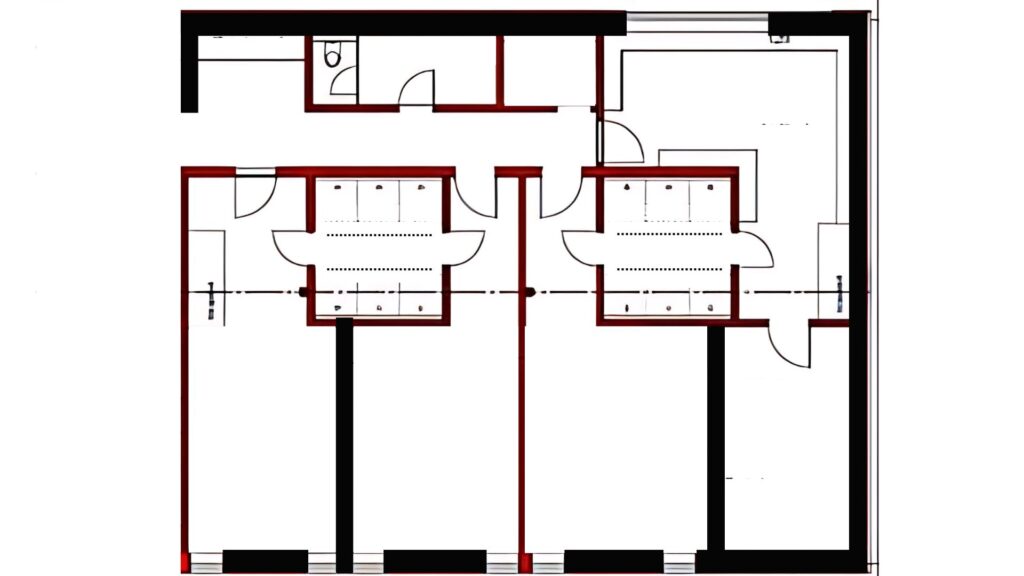
Energy-efficient refurbishment for sports clubs through sustainable heating control
January 20, 2025
It is not only companies, institutions and public authorities that are facing major challenges as the energy transition progresses. Clubs with self-managed properties also need modern and innovative concepts to reduce the energy and heating costs of their facilities and premises.
The example of Turn- und Rasensportverein Freienohl 88/09 e.V. (TuRa Freienohl) shows how this can be achieved successfully and sustainably with energy harvesting. Honeywell PEHA and DEUTA Controls relied on battery-free and wireless EnOcean products for planning and implementation.
Adapting heating phases to the effective use of rooms
TuRa Freienohl in North Rhine Westphalia offers its members a comprehensive range of services in seven sports. The sports facilities include sports and soccer pitches, a swimming pool and a sports hall. The club also has its own sports hall with changing rooms and a community and multi-purpose room. Honeywell PEHA and DEUTA Controls developed a sustainable concept to comprehensively reduce heating and energy costs. The aim was to effectively adapt the heating phases to the use of the premises, for example for festivities as well as sporting events. “The management board gave us a free hand with the implementation and relied on our expertise. And we wanted to ensure that the system to be installed was used as effectively as possible when the premises were actually in use,” explains Wolfgang Arndt, Senior Territory Manager Electrical Products at Honeywell PEHA responsible for Germany.

Picture 1: The solution by Deuta Controls and Honeywell PEHA adapts the heating phases to the use of the premises, e.g., of the changing rooms.
Proven EnOcean technology to save energy in buildings
The area to be equipped in the common room, the changing rooms for the home and visiting teams and the referee’s booth amounted to around 150 square meters. Honeywell PEHA and DEUTA Controls relied on products with wireless communication based on the EnOcean wireless standard for energy-efficient refurbishment. Nearly all components are energy self-sufficient. The overall package comprised 14 window contact sensors, four motion detectors and temperature sensors as well as ten actuators and four Eno Puck 4-Room control units. “The latter is an individual room temperature control system based on EnOcean technology. Each control unit supports up to four heating valve drives, four window contacts and external temperature sensors. As with all energy harvesting products, the advantages are battery-free operation and simple installation and set-up. This makes it a perfect solution for saving energy in buildings,” explains Michael Lehzen, Managing Director of DEUTA Controls GmbH.
Heating energy only when motion is detected
“Actuators, motion detectors, window contacts and temperature sensors obtain the energy they need from integrated, high-quality solar modules or thermal energy. The required data is then transmitted wirelessly using the proven EnOcean wireless standard“, emphasizes Henning Meyer, project coordinator at EnOcean GmbH. The control unit also requires very little energy and regulates the different rooms depending on usage. Heating energy is therefore only requested when the sensors detect movement in the rooms. This eliminates the need for heating when the sports home is not in use. Ultimately, the sports club’s premises are supplied with heat efficiently and very economically in the long term. And after some initial skepticism, the athletes and users have also realized that the implemented solution is not a restriction but offers real added value.
Realizing high savings potential with minimal effort
“With our system solution, heating costs can ideally be reduced by more than 40 percent. This means that such a system usually pays for itself in a very short time. Another advantage is that it can be installed during ongoing operation without restricting use. In addition, ongoing maintenance of the various modules, for example with new batteries, is not necessary. There is also no need to lay cables or carry out renovation work on the sensors and actuators. All of this helps to reduce CO2 emissions,” emphasizes Wolfgang Arndt. The desired basic temperature is initially specified by the operator. However, users have the option of intervening in the heating mode via a room temperature controller. The system then independently controls the effective heating output using the various sensor data.
Pioneering climate protection
The board of TuRa Freienohl was already impressed after the first test phase and is convinced of the sustainable success. “Minimal effort achieves enormous savings potential and also protects the environment. The efficient approach and the well thought-out planning and implementation make TuRa Freienohl not only smarter for the future, but also a sporting pioneer in climate protection,” says a member of the club’s board. Ultimately, the project shows the potential and opportunities for clubs to sustainably reduce energy and heating costs in their clubhouses. Well thought-out energy management and clever space optimization also improve the wellbeing of the users.
Where to buy
Find the right distributor for our modules, components and finished products in your region!

Stay up to date and subscribe to our newsletter!
The EnOcean newsletter informs you regularly about exciting projects in the areas of IoT and smart buildings as well as current events and new products.
More EnOcean
Visit us
© 2025 EnOcean GmbH. All rights reserved.
